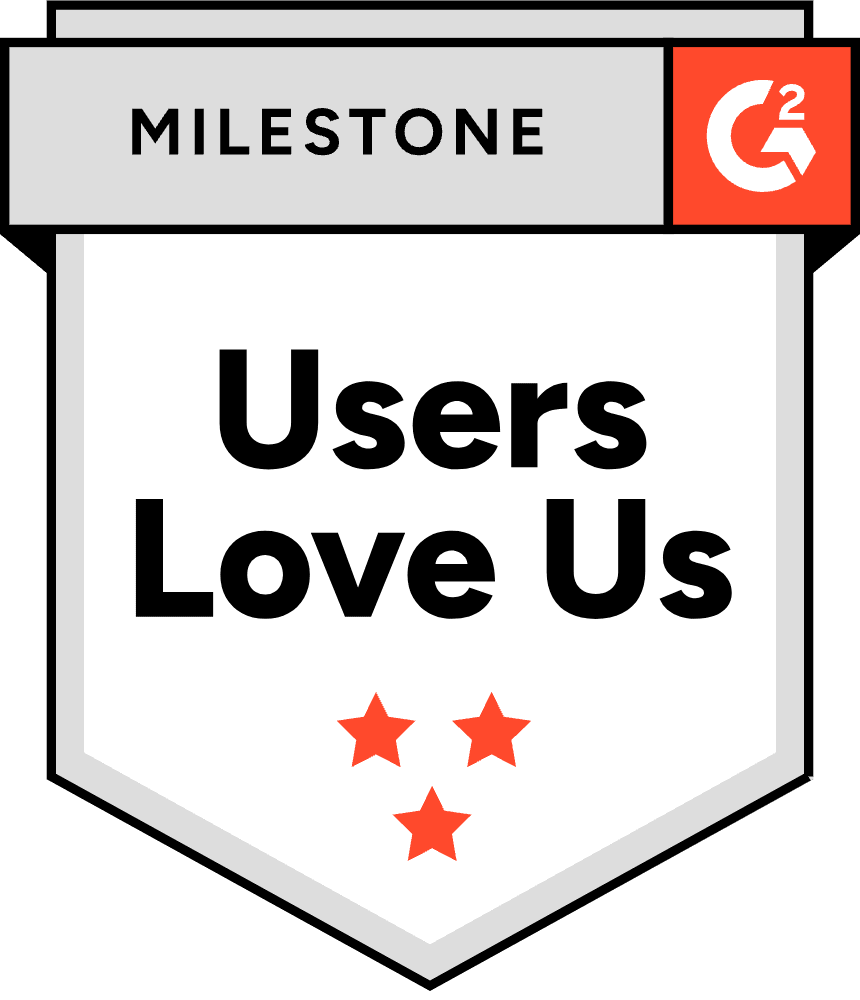| RocketReach | Apollo | |
|---|---|---|
| Best for | Teams that mainly need fast email/phone discovery and a large global people directory. | Teams that want an all-in-one prospecting + sequencing + intent + enrichment stack. |
| Database size | 700M+ professional profiles and 35M+ companies (RocketReach Chrome Web Store listing, Oct 2025) | Contacts: 275M+ (Jun 26 2025); 35M+ companies (Apollo site; note: another Apollo page cites 210M+ contacts as of Sept 11 2024) |
| Free plan credits & send limits | 0–15 free credits/month (varies by demand) + free real-time searches; no credit card required | 1,200 email credits/year (granted 100/month) on Free; 250 daily send limit on Free & Basic |
| Paid pricing | Essentials: $39/user/month monthly or $19/user/month billed annually ($229/year); 80 credits/month (monthly) or 1,200/year (annual); 70 exports/month (monthly) or 1,200/year (annual). Pro: $99/user/month monthly or $52/user/month billed annually ($619/year); 200 credits/month (monthly) or 3,600/year (annual); 200 exports/month (monthly) or 3,600/year (annual). Ultimate: $169/user/month monthly or $140/user/month billed annually ($1,679/year); 500 credits/month (monthly) or 10,000/year (annual); 1,000 exports/month (monthly) or 20,000/year (annual). | Basic: $59/user/month monthly or $49/user/month billed annually; 2,500 credits/month (30,000/year). Professional: $99/user/month monthly or $79/user/month billed annually; 4,000 credits/month (48,000/year). Organization: $149/user/month (annual); 6,000 credits/month (72,000/year); min 3 seats via sales. |
| Notable features | Chrome extension that finds emails/phones and social links on websites & LinkedIn; claims 85%+ email/social find rate and SMTP validation. | Prospecting with 200+ data attributes/filters; automated sequences + A/B testing; Buyer/Topic Intent signals available on all plans with 98% accuracy (powered by LeadSift/Bombora). |
| Integrations | Chrome Extension for LinkedIn & company sites | Salesforce, HubSpot, Outreach, Salesloft, Marketo, SendGrid, LinkedIn, plus Gmail/Microsoft 365 inbox integrations |
| Watch-outs | Monthly plans cap credits/exports (see exact caps above). | “Organization” is annual with 3-seat minimum; free/basic have 250/day email send cap; intent topics gated by plan. |
“Your team needs verified contacts and scalable outreach, but your reps lose hours chasing bad emails and outdated data. Budgets are tighter and you cannot afford to guess.
Pick the wrong platform and you burn credits, rack up bounces, and stall pipeline while competitors hit quota first.
In this guide, we compare RocketReach and Apollo across database coverage, verification quality, automations, integrations, and pricing so you can choose the right fit for your motion: pure sourcing versus an all-in-one prospecting and engagement stack.
What is RocketReach?
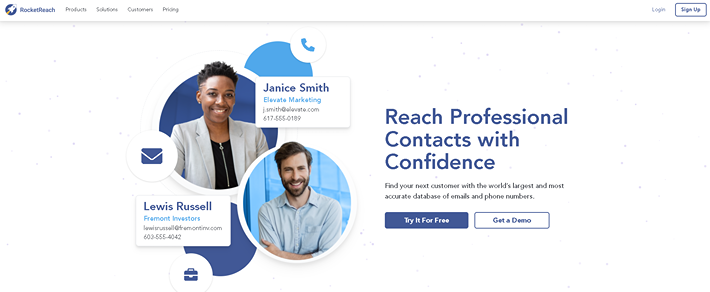
RocketReach is a B2B contact discovery and verification platform with a large people and company database and a Chrome extension for finding emails and direct dials. RocketReach cites a database of 700M+ professional profiles and 35M+ company profiles (per its official Chrome Web Store listing).
RocketReach sources its data from various channels, such as web pages, APIs, online profiles, and social media platforms. It vets all its data with advanced algorithms and machine-learning techniques to ensure accuracy.
As a RocketReach user, you can search for specific contacts based on various criteria, such as job titles, industries, company sizes, locations, and more.
RocketReach Pros & Cons
Pros:
- One of RocketReach’s major selling points is its massive database of 700M+ professional profiles and 35M+ company profiles (RocketReach Chrome Web Store listing, Oct 2025).
- RocketReach’s Chrome extension listing claims it can return emails and social links for 85%+ of prospects (find rate), with SMTP validation.
- There is an advanced search feature with multiple firmographic and technographic filters.
- Chrome Extension for LinkedIn and company websites (vendor source available).
Cons:
- Monthly plans cap credits and exports (see exact caps in pricing section).
- Free plan includes 0–15 free credits/month (varies by demand) and free real-time searches; no credit card required.
What is Apollo?
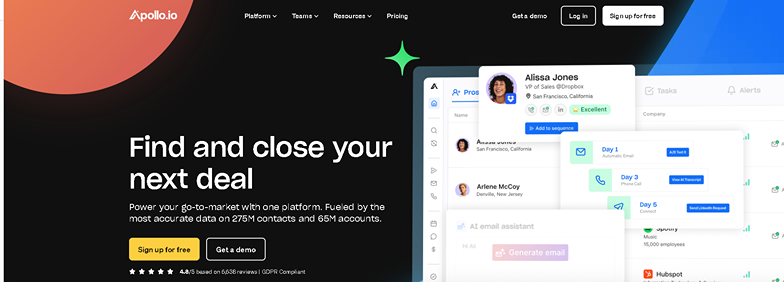
Apollo is an all-in-one sales platform that combines a B2B contacts database with prospecting, sequences, inbox integrations, and intent. Apollo cites 275M+ contacts (Jun 26 2025, Apollo site) and 35M+ companies (same site). Note: another official Apollo page still references 210M+ contacts (as of Sept 11 2024).
However, Apollo’s strength lies in its ability to streamline the entire lead generation process, from identifying prospects to engaging with them effectively. Its 200+ data attributes/filters for precise targeting (Apollo site wording) include firmographic, demographic, and technographic data points, so users can create highly targeted prospect lists tailored to their specific needs.
The platform offers advanced features such as automated sequences, A/B testing, and Buyer/Topic Intent data is included on all plans (incl. Free), with ~98% accuracy, powered by LeadSift and Bombora, enabling sales teams to optimize their outreach strategies and close more deals.
Apollo Pros & Cons
Pros:
- Apollo has robust prospecting and engagement features, including automated sequences and A/B testing.
- Buyer/Topic Intent data is included on all plans (incl. Free), with ~98% accuracy, powered by LeadSift and Bombora; one intent topic is included on Free.
- Native integrations include Salesforce, HubSpot, Outreach, Salesloft, Marketo, SendGrid, LinkedIn, plus Gmail and Microsoft 365 mailbox integrations (per Apollo pricing FAQ).
- Offers Free, Basic, Professional, and Organization tiers with credits granted monthly or annually; see pricing details below.
Cons:
- “Organization” is annual with 3-seat minimum; free/basic have 250/day email send cap; intent topics gated by plan.
- The platform offers limited customization options for certain features.
RocketReach vs. Apollo Comparison Guide
RocketReach and Apollo are powerful B2B sales intelligence tools. Being both dedicated to streamlining the lead generation process, they have some common characteristics. Below are the key areas where these platforms differ or are similar.
Key Features
RocketReach and Apollo have key features designed to simplify the prospecting process and enhance sales productivity. While both platforms offer advanced search capabilities and CRM integrations, Apollo stands out with its emphasis on automated sequences, A/B testing, and Buyer/Topic Intent data is included on all plans (incl. Free), with ~98% accuracy, powered by LeadSift and Bombora.
RocketReach
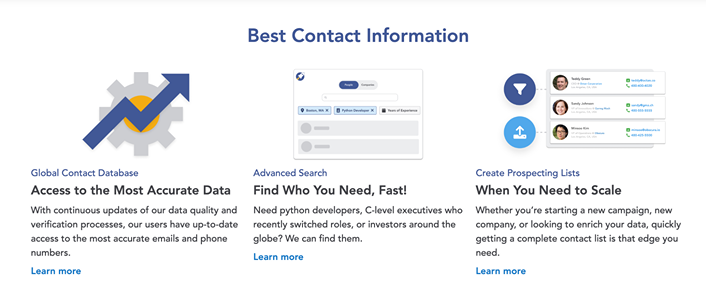
- Advanced Search: Like Apollo, RocketReach has an advanced search feature with multiple firmographic and technographic filters. It uses AI to provide ultra-specific search results and make profile recommendations to increase your chances of finding the right contact.
- Lists: This is a feature unique to RocketReach. With this feature, users can create contact lists on the platform, making their work quicker and more efficient.
- Intent Data: RocketReach lists Intent data as part of the Ultimate plan’s ‘Advanced data’ add-ons in the official pricing materials.
- Integration: Chrome Extension for LinkedIn and company websites (vendor source available).
- Email Tracking: RocketReach’s Chrome extension lets you ‘track and monitor performance’ of outreach.
Apollo
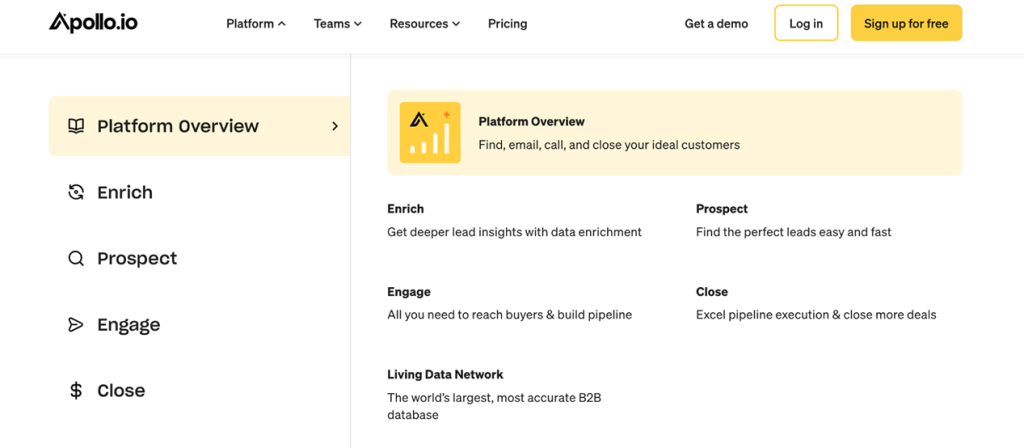
Apollo has several valuable features that make searching through its extensive contact database easy. A few are highlighted below.
- Technology Tracking: Apollo users have access to a technology tracking feature that allows them to search through the contact database and find which technologies a company uses (per Apollo’s “Data: Personas” page noting technographic data among attributes).
- Buyer/Topic Intent Data: Buyer/Topic Intent data is included on all plans (incl. Free), with ~98% accuracy, powered by LeadSift and Bombora; one intent topic is included on Free. This feature alerts you when your prospects are actively searching for the solutions you provide.
- Automated Sequences: Similar to RocketReach’s Lists feature, Apollo allows you to create automated sequences of emails, phone calls, and general tasks. This strategic sequencing can help optimize your engagement with prospects.
- A/B Testing: Apollo’s A/B testing capabilities let you test different strategies and optimize your approach to find the best-performing outreach tactics. It also has built-in safeguards, which prevent you from spamming prospects or sending duplicate messages.
Database & Contact Reliability
The reliability and accuracy of the underlying data are critical factors when evaluating B2B sales intelligence tools. Let’s compare the database and contact reliability of RocketReach and Apollo.
RocketReach
RocketReach cites 700M+ professional profiles and 35M+ companies (Chrome Web Store, accessed Oct 2025), while Apollo’s own pages cite between 210M+ and 275M+ contacts and ~35M+ companies depending on the page and date (see cited Apollo pages). You can find the contact information of just about any business or professional, making RocketReach an incredibly powerful tool.
This data is collected from various sources, such as web pages, APIs, online profiles, and social media platforms. It includes essential information like email addresses (personal and professional), phone numbers (direct dials and mobile), and firmographic data points like annual revenue, number of employees, industry, and location.
RocketReach’s Chrome extension listing claims it can return emails and social links for 85%+ of prospects (find rate), with SMTP validation.
Apollo
RocketReach’s people count is higher by vendor claim (700M+ vs Apollo’s 210M–275M+ contacts depending on page); Apollo cites ~35M+ companies, similar to RR’s 35M+. This data is sourced from scraped websites, machine learning algorithms, and a proprietary data network.
Integrations & API
Both RocketReach and Apollo can integrate smoothly with other tools and applications. This means you don’t have to be on the platform to have access to their features. Let’s examine each tool’s integration features below.
RocketReach
- Chrome Extension for LinkedIn and company websites (vendor source available).
Apollo
- Native integrations include Salesforce, HubSpot, Outreach, Salesloft, Marketo, SendGrid, LinkedIn, plus Gmail and Microsoft 365 mailbox integrations (per Apollo pricing FAQ).
Usability
The user experience and ease of implementation are crucial factors when evaluating B2B sales intelligence tools. This means that we can also compare these two tools based on usability. Let’s see what each tool offers users in this regard below.
RocketReach
RocketReach’s interface is designed with simplicity in mind, making it easy for users to navigate and quickly find the information they need. The platform is relatively straightforward, with browser extensions and CRM add-ins that can be set up within minutes, even for non-technical users.
Apollo
On the other hand, Apollo’s interface is more complex than that of RocketReach. You might need to customize it to your specific use case to be able to find your way around easily. For example, you might map data fields to your CRM or design your custom campaigns for easy navigation.
Chrome Extension
Both RocketReach and Apollo offer Chrome extensions that seamlessly integrate with web browsing, giving you instant access to contact information.
RocketReach
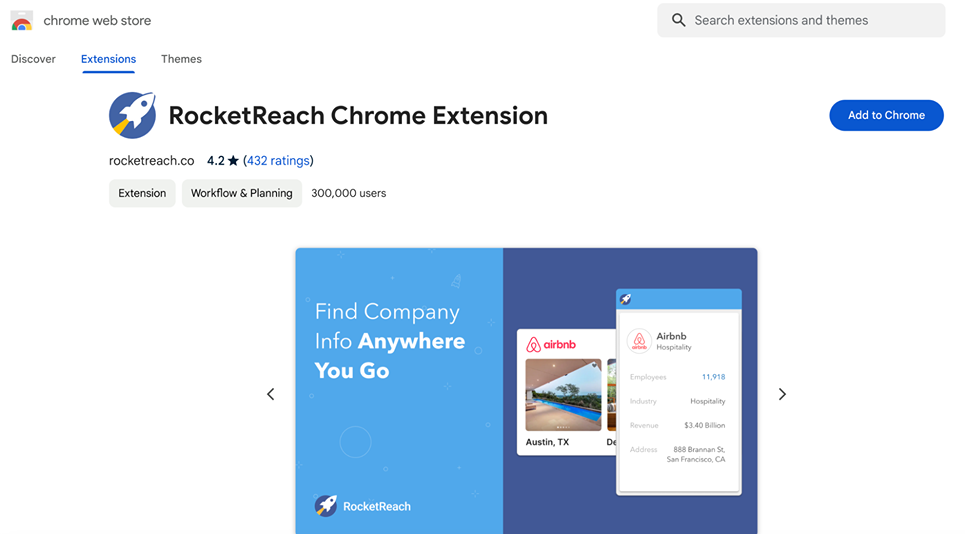
Free Chrome extension surfaces emails/phones and social links on websites and LinkedIn; vendor claims 85%+ find rate; supports exporting found data. With it, you can instantly view full names, email addresses, phone numbers, employment history, and any other available details that RocketReach has on an individual or company.
The extension also allows you to export surfaced data, initiate outreach campaigns, and update CRM records directly from the web.
Apollo
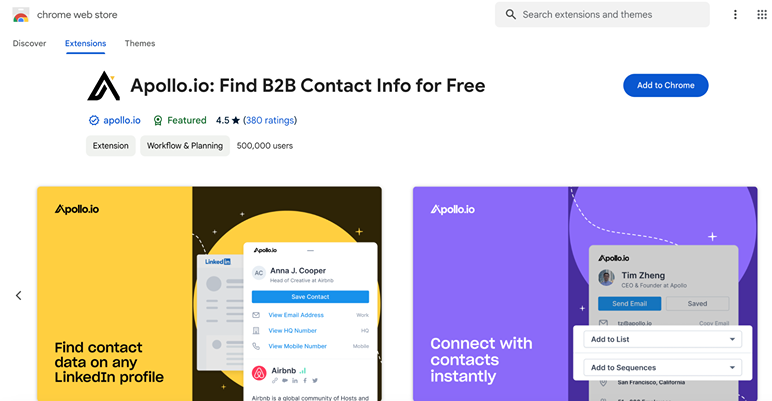
Chrome extension provides verified emails, direct dials, and prospecting while browsing (incl. LinkedIn). It seamlessly integrates with LinkedIn, giving users access to contact information directly from LinkedIn profiles.
Plans & Pricing
Pricing is important when evaluating B2B sales intelligence tools, especially for businesses operating on tight budgets. Let’s explore the pricing structures of RocketReach and Apollo.
RocketReach
RocketReach has four pricing plans, including one free plan and three paid plans. The paid plans are Essentials, Pro, and Ultimate, each unlocking unique features.
- Free Plan: Free plan includes 0–15 free credits/month (varies by demand) and free real-time searches; no credit card required.
- Essentials Plan: $39/user/month (monthly) or $19/user/month billed annually ($229/year); 80 credits/month (monthly) or 1,200/year (annual); exports 70/month (monthly) or 1,200/year (annual).
- Pro Plan: $99/user/month (monthly) or $52/user/month billed annually ($619/year); 200 credits/month (monthly) or 3,600/year (annual); exports 200/month (monthly) or 3,600/year (annual).
- Ultimate Plan: $169/user/month (monthly) or $140/user/month billed annually ($1,679/year); 500 credits/month (monthly) or 10,000/year (annual); exports 1,000/month (monthly) or 20,000/year (annual).
Apollo
Like RocketReach, Apollo offers four pricing plans, including free and three paid plans.
- Free Plan: 1,200 email credits/year (granted 100/month); 250 emails/day send cap.
- Basic Plan: $59/user/month (monthly) or $49/user/month billed annually; 2,500 credits/month (30,000/year).
- Professional Plan: $99/user/month (monthly) or $79/user/month billed annually; 4,000 credits/month (48,000/year).
- Organization Plan: $149/user/month (annual); 6,000 credits/month (72,000/year); min 3 seats via sales. You can purchase Free/Basic/Professional online; Organization requires talking to Sales.
RocketReach vs. Apollo Comparison Table
Below is a table showing a comparison of the two sales intelligence tools.
| RocketReach | Apollo | |
| Database Size | 700M+ professional profiles and 35M+ companies (Chrome Web Store, Oct 2025) | 275M+ contacts (Jun 26 2025) and 35M+ companies (Apollo site; note: another page cites 210M+ contacts as of Sept 11 2024) |
| Data Types | RocketReach data includes contact info like names, emails, and phone numbers, and firmographic data points like revenue, employee count, and location. | Also includes contact info and firmographic data points like annual revenue, business type, employee count, location, and so on. |
| Unique Features | Lists, AI-enhanced search, intent data (Ultimate plan), and so on. | Automated sequences, A/B testing, Buyer/Topic Intent data (all plans, 98% accuracy, LeadSift/Bombora), and so on. |
| Free plan | 0–15 free credits/month (varies) + free searches; no card. | 1,200 email credits/year (100/mo); 250 emails/day send cap. |
| Pricing | Essentials: $39/user/month (monthly) or $19/user/month billed annually ($229/year); 80 credits/month (monthly) or 1,200/year (annual); 70 exports/month (monthly) or 1,200/year (annual). Pro: $99/user/month (monthly) or $52/user/month billed annually ($619/year); 200 credits/month (monthly) or 3,600/year (annual); 200 exports/month (monthly) or 3,600/year (annual). Ultimate: $169/user/month (monthly) or $140/user/month billed annually ($1,679/year); 500 credits/month (monthly) or 10,000/year (annual); 1,000 exports/month (monthly) or 20,000/year (annual). | Basic: $59/user/month (monthly) or $49/user/month billed annually; 2,500 credits/month (30,000/year). Professional: $99/user/month (monthly) or $79/user/month billed annually; 4,000 credits/month (48,000/year). Organization: $149/user/month (annual); 6,000 credits/month (72,000/year); min 3 seats via sales. |
| Chrome Extension | Available in both free and paid plans. | Available in both free and paid plans. |
| Integrations | Chrome Extension for LinkedIn & company sites | Salesforce, HubSpot, Outreach, Salesloft, Marketo, SendGrid, LinkedIn; Gmail & Microsoft 365 inbox |
| Compliance | States compliance with data privacy regulations | GDPR, SOC 2 Type II, ISO 27001, SSO/SAML |
| Target User | Businesses of all sizes and industries. | Businesses of all sizes and industries. |
| Best For | Sales intelligence, lead generation, building prospect lists | Sales intelligence, lead generation, identifying and engaging with prospects |
RocketReach vs. Apollo: The Bottom Line
After an in-depth comparison of RocketReach and Apollo, it’s clear that both platforms offer various rich features and capabilities to streamline the lead generation process. However, the choice between the two may depend on your business needs and priorities.
Choose RocketReach If You Prioritize Simplicity and Ease of Use
RocketReach shines with its user-friendly interface and straightforward implementation process, making it an ideal choice for businesses that prioritize simplicity and ease of use. Its Chrome extension for quick lookup + SMTP validation and monthly credit caps make it suitable for teams focused on fast contact discovery. However, all this might be to little avail if you can’t easily find your way around the platform.
Choose Apollo If You Require Advanced Automation and Engagement Features
If your business requires sequences, A/B testing, and intent (all vendor-verified) to optimize outreach strategies and close more deals, Apollo may be the better choice. Its automated sequences, A/B testing capabilities, and Buyer/Topic Intent data is included on all plans (incl. Free), with ~98% accuracy, powered by LeadSift and Bombora empowers sales teams to engage with high-intent prospects effectively.
UpLead is the All in One Alternative
While both RocketReach and Apollo offer compelling features, they have their limits. UpLead makes up for these limits by combining the strengths of both platforms. With an extensive database boasting over 160 million email addresses and 19+ million company profiles, UpLead provides reliable and accurate data with a 95% accuracy rate. This makes it a viable alternative to both tools.
Its advanced search filter feature, real-time email verification, and technographic data tracking make it a powerful tool for finding and engaging with high-quality leads. UpLead’s transparent and affordable pricing structure makes it an attractive option for businesses of all sizes. Users also enjoy a 7-day free trial with 5 credits and a Chrome extension.
FAQs About RocketReach vs. Apollo
Here are some frequently asked questions about RocketReach and Apollo.
It depends on your motion: choose RocketReach for fast contact discovery at seat-based pricing; choose Apollo for combined database + sequences + intent + CRM/marketing integrations.
No, neither RocketReach nor Apollo are Customer Relationship Management (CRM) platforms. Apollo positions itself as an AI sales platform with CRM integrations, not a CRM. They are sales intelligence tools specializing in lead generation, prospecting, and contact data management. However, both platforms offer integrations with popular CRM solutions like HubSpot and Salesforce.
RocketReach and Apollo are used by businesses of various sizes and industries for their lead generation and sales prospecting needs.
What You Need to Remember About RocketReach vs. Apollo
- RocketReach cites 700M+ professional profiles and 35M+ companies (Chrome Web Store, accessed Oct 2025), while Apollo’s own pages cite between 210M+ and 275M+ contacts (Jun 26 2025 for 275M+; Sept 11 2024 for 210M+) and ~35M+ companies depending on the page and date.
- Apollo offers automated sequences, A/B testing, and Buyer/Topic Intent data is included on all plans (incl. Free), with ~98% accuracy, powered by LeadSift and Bombora; native integrations include Salesforce, HubSpot, Outreach, Salesloft, Marketo, SendGrid, LinkedIn, plus Gmail and Microsoft 365 mailbox integrations.
- RocketReach: Essentials $39/user/month (monthly) or $19/user/month billed annually ($229/year); 80 credits/month (monthly) or 1,200/year (annual); exports 70/month (monthly) or 1,200/year (annual). Pro $99/user/month (monthly) or $52/user/month billed annually ($619/year); 200 credits/month (monthly) or 3,600/year (annual); exports 200/month (monthly) or 3,600/year (annual). Ultimate $169/user/month (monthly) or $140/user/month billed annually ($1,679/year); 500 credits/month (monthly) or 10,000/year (annual); exports 1,000/month (monthly) or 20,000/year (annual).
- Apollo: Basic $59/user/month (monthly) or $49/user/month billed annually; 2,500 credits/month (30,000/year). Professional $99/user/month (monthly) or $79/user/month billed annually; 4,000 credits/month (48,000/year). Organization $149/user/month (annual); 6,000 credits/month (72,000/year); min 3 seats via sales.
- UpLead is a great alternative combining the strengths of RocketReach and Apollo into one comprehensive sales intelligence solution.






